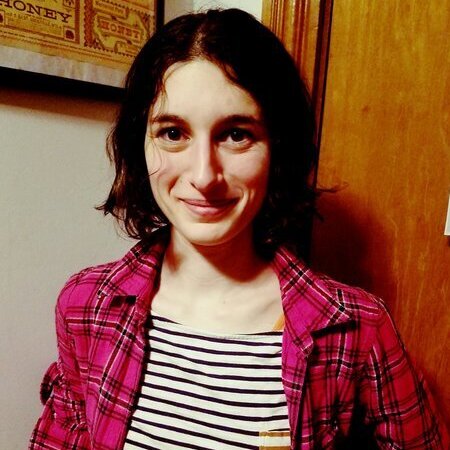Team
Abby Basya Finkelstein

How I got into science
I was working at a pharmaceutical company one summer in college, and came across the term “pheromone.” My interest piqued by the idea of floating chemicals that can have the power to modify everything from animals’ learning abilities to their capacity for reproduction, I looked for more examples and was linked to an article about honey bees. One article led to the next and soon my icebreaker for meeting new people became the process of how worker bees “vote” on whether to make a new baby queen depending on their threshold for circulating queen pheromone. I was hooked in a way that I had never previously experienced; the world of social insects felt like a playground.
There weren’t any social insect labs at Brandeis, my alma mater, so I started working with Dr. Sarah Kocher in Dr. Naomi Pierce’s lab at Harvard. We used a species of sweat bee that exhibits polymorphic sociality (sometimes social, sometimes solitary) to tackle questions about the evolution of social behavior. Sarah brought me to places in the Boston area that I’d been to a million times before and taught me to find animals and behaviors I’d never imagined existing, like tiny chimneys of packed soil poking out from the ground to prevent water from flooding bees’ nests. My previous internships in the Birren and Griffith labs at Brandeis, and particularly the guidance of Dr. Nathan Donelson, had deepened my grasp of intricate neuromodulation, circuitry, and genetics on the scale of individual brains. The Pierce lab showed me how to zoom waaay out to witness how brains and behaviors have been shaped through grand time scales by changing environments and inter-species interactions. I’ll always be grateful for Dr. Kocher and Dr. Pierce’s support and strong mentorship, and for the truly incredible sandwiches Sarah got me after long days looking for shiny green bees in places ranging from Harvard Square to seaside villages in France. With Sarah’s encouragement, after undergrad I started a PhD in Dr. Gro Amdam’s lab at Arizona State University.
During my PhD, I worked in the field of honey bee neurethology to understand how differences in neurochemistry and behavior arise from honey bees’ foraging experiences. My questions continue to evolve, but they always stem from the same big-picture curiosity about how individuals “click” through different states in which they react to the world in dramatically different ways within a single life-span and often within a single day… which I've wondered about ever since I was a little kid trying to figure out the behaviors of the adults around me.
Research Interests
The brain does an elegant job of using prior experience to adaptively respond to whatever the environment throws its way. Yet, these responses are guided not only by relevant past events, but also by an animal’s current state. When you’re in a lousy mood, the memories that can be easily retrieved to make decisions might be different than when the sun is shining. Currently, my work explores how social encounters and events that trigger affective states (ie food, sex, stress) bias access to memories, and impact subsequent extinction and reinstatement.
Favorite...
Book:
Genghis Khan and the Making of the Modern World
Movie:
Wit
Show:
Jane the Virgin
Music:
Thomas Newman soundtracks, Glenn Gould playing Bach, James Blake, Vienna Teng, Dear Hunter, Lily Allen
Food:
alternate bites of a briny pickle and a quality tomato
Drink:
whiskey that’s not too sweet
Activity:
Acroyoga/hiking with an off-leash pup/writing a novel that may or may not ever see the light of day
Coffee, friend or foe:
domestic partner
One thing I’m sorry I’m not sorry about
My passion for the endless dietary and scientific possibilities of condensed milk
What I look for in a scientist
The ability to really hear and get jazzed up about someone else’s ideas. And I dig passion for one’s own grandiose theories when it’s tempered by the need to figure out why they’re wrong. In terms of day-to-day labwork, I’m inspired by those who work thoughtfully and with joy, choosing or creating environments in which hypotheses thrive rather than survive. Socializing in the sciency sphere is most enjoyable for me when straight-forwardness, curiosity, and empathy trump etiquette and cliquiness.